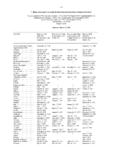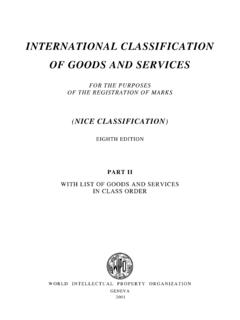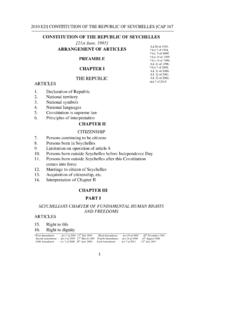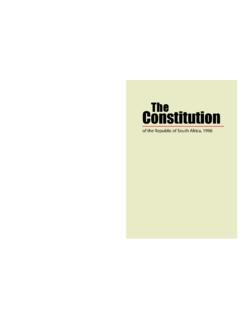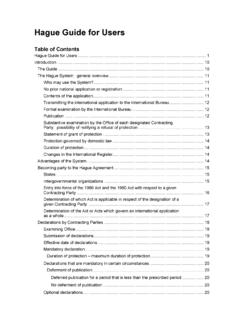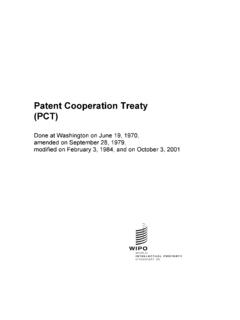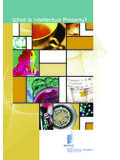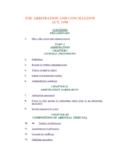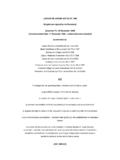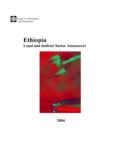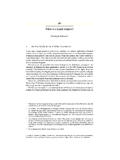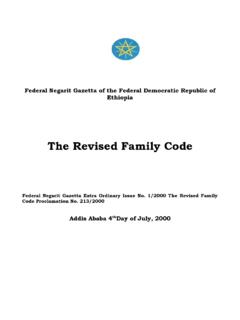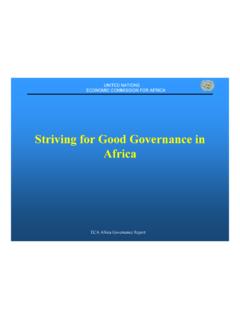Transcription of Constitution of the Federal Democratic Republic of Ethiopia
1 Constitution OF THE Federal Democratic Republic OF Ethiopia PREAMBLE We, the Nations, Nationalities and Peoples of Ethiopia : Strongly committed, in full and free exercise of our right to self-determination, to building a political community founded on the rule of law and capable of ensuring a lasting peace, guaranteeing a Democratic order, and advancing our economic and social development; Firmly convinced that the fulfillment of this objective requires full respect of individual and people s fundamental freedoms and rights, to live together on the basis of equality and without any sexual, religious or cultural discrimination; Further convinced that by continuing to live with our rich and proud cultural legacies in territories we have long inhabited, have, through continuous interaction on various levels and forms of life, built up common interest and have also contributed to the emergence of a common outlook; Fully cognizant that our common destiny can best be served by rectifying historically unjust relationships and by further promoting our shared interests; Convinced that to live as one economic community is necessary in order to create sustainable and mutually supportive conditions for ensuring respect for our rights and freedoms and for the collective promotion of our interests; Determined to consolidate, as a lasting legacy, the peace and the prospect of a Democratic order which our struggles and sacrifices have brought about.
2 Have therefore adopted, on 8 December 1994 this Constitution through representatives we have duly elected for this purpose as an instrument that binds us in a mutual commitment to fulfil the objectives and the principles set forth above. CHAPTER ONE GENERAL PROVISIONS Article 1 Nomenclature of the State This Constitution establishes a Federal and Democratic State structure. Accordingly, the Ethiopian state shall be known as the Federal Democratic Republic of Ethiopia . Article 2 Ethiopian Territorial Jurisdiction The territorial jurisdiction of Ethiopia shall comprise the territory of the members of the Federation and its boundaries shall be as determined by international agreements. Article 3 The Ethiopian Flag 1. The Ethiopian flag shall consist of green at the top, yellow in the middle and red at the bottom, and shall have a national emblem at the center. The three colors shall be set horizontally in equal dimension.
3 2. The national emblem on the flag shall reflect the hope of the Nations, Nationalities, Peoples as well as religious communities of Ethiopia to live together in equality and unity. 3. Members of the Federation may have their respective flags and emblems and shall determine the details thereof through their respective legislatures. Article 4 National Anthem of Ethiopia The national anthem of Ethiopia , to be determined by law, shall reflect the ideals of the Constitution , the Commitment of the Peoples of Ethiopia to live together in a Democratic order and of their common destiny. Article 5 Languages 1. All Ethiopian languages shall enjoy equal state recognition. 2. Amharic shall be the working language of the Federal Government. 3. Members of the Federation may by law determine their respective working languages. Article 6 Nationality 1. Any person of either sex shall be an Ethiopian national where both or either parent is Ethiopian.
4 2. Foreign nationals may acquire Ethiopian nationality. 3. Particulars relating to nationality shall be determined by law. Article 7 Gender Reference Provisions of this Constitution set out in the masculine gender shall also apply to the feminine gender. CHAPTER TWO FUNDAMENTAL PRINCIPLES OF THE Constitution Article 8 Sovereignty of the people 1. All sovereign power resides in the Nations, Nationalities and Peoples of Ethiopia . 2. This Constitution is an expression of their sovereignty. 3. Their sovereignty shall be expressed through their representatives elected in accordance with this Constitution and through their direct Democratic participation Article 9 Supremacy of the Constitution 1. The Constitution is the supreme law of the land. Any law, customary practice or a decision of an organ of state or a public official which contravenes this Constitution shall be of no effect. 2. All citizens, organs of state, political organizations, other associations as well as their officials have the duty to ensure observance of the Constitution and to obey it.
5 3. It is prohibited to assume state power in any manner other than that provided under the Constitution . 4. All international agreements ratified by Ethiopia are an integral part of the law of the land. Article 10 Human and Democratic Rights 1. Human rights and freedoms, emanating from the nature of mankind, are inviolable and inalienable. 2. Human and Democratic rights of citizens and peoples shall be respected. Article 11 Separation of State and Religion 1. State and religion are separate. 2. There shall be no state religion. 3. The state shall not interfere in religious matters and religion shall not interfere in state affairs. Article 12 Conduct and Accountability of Government 1. The conduct of affairs of government shall be transparent. 2. Any public official or an elected representative is accountable for any failure in official duties. 3. In case of loss of confidence, the people may recall an elected representative.
6 The particulars of recall shall be determined by law. CHAPTER THREE FUNDAMENTAL RIGHTS AND FREEDOMS Article 13 Scope of Application and Interpretation 1. All Federal and State legislative, executive and judicial organs at all levels shall have the responsibility and duty to respect and enforce the provisions of this Chapter. 2. The fundamental rights and freedoms specified in this Chapter shall be interpreted in a manner conforming to the principles of the Universal Declaration of Human Rights, International Covenants on Human Rights and International instruments adopted by Ethiopia . PART ONE HUMAN RIGHTS Article 14 Rights to life, the Security of Person and Liberty Every person has the inviolable and inalienable right to life the security of person and liberty. Article 15 Right to Life Every person has the right to life. No person may be deprived of his life except as a punishment for a serious criminal offence determined by law.
7 Article 16 The Right of the Security of Person Every one has the right to protection against bodily harm. Article 17 Right to Liberty 1. No one shall be deprived of his or her liberty except on such grounds and in accordance with such procedure as are established by law. 2. No person may be subjected to arbitrary arrest, and no person may be detained without a charge or conviction against him. Article 18 Prohibition against Inhuman Treatment 1. Everyone has the right to protection against cruel, inhuman or degrading treatment or punishment. 2. No one shall be held in slavery or servitude. Trafficking in human beings for whatever purpose is prohibited. 3. No one shall be required to perform forced or compulsory labour. 4. For the purpose of sub-Article 3 of this Article the phrase "forced or compulsory labour" shall not include: a. Any work or service normally required of a person who is under detention in consequence of a lawful order, or of a person during conditional release from such detention; b.
8 In the case of conscientious objectors, any service exacted in lieu of compulsory military service; c. Any service exacted in cases of emergency or calamity threatening the life or well-being of the community; d. Any economic and social development activity voluntarily performed by a community within its locality. Article 19 Right of Persons Arrested 1. Persons arrested have the right to be informed promptly, in a language they understand, of the reasons for their arrest and of any charge against them. 2. Persons arrested have the right to remain silent. Upon arrest, they have the right to be informed promptly, in a language they understand, that any statement they make may be used as evidence against them in court. 3. Persons arrested have the right to be brought before a court within 48 hours of their arrest. Such time shall not include the time reasonably required for the journey from the place of arrest to the court.
9 On appearing before a court, they have the right to be given prompt and specific explanation of the reasons for their arrest due to the alleged crime committed. 4. All persons have an inalienable right to petition the court to order their physical release where the arresting police officer or the law enforcer fails to bring them before a court within the prescribed time and to provide reasons for their arrest. Where the interest of justice requires, the court may order the arrested person to remain in custody or, when requested remand him for a time strictly required to carry out the necessary investigation. In determining the additional time necessary for investigation, the court shall ensure that the responsible law enforcement authorities carry out the investigation respecting the arrested person s right to a speedy trial. 5. Persons arrested shall not be compelled to make confessions or admissions which could be used in evidence against them.
10 Any evidence obtained under coercion shall not be admissible. 6. Persons arrested have the right to be released on bail. In exceptional circumstances prescribed by law, the court may deny bail or demand adequate guarantee for the conditional release of the arrested person. Article 20 Rights of Persons Accused 1. Accused persons have the right to a public trial by an ordinary court of law within a reasonable time after having been charged. The court may hear cases in a closed session only with a view to protecting the right to privacy of the parties concerned, public morals and national security. 2. Accused persons have the right to be informed with sufficient particulars of the charge brought against them and to be given the charge in writing. 3. During proceedings accused persons have the right to be presumed innocent until proved guilty according to law and not to be compelled to testify against themselves.
